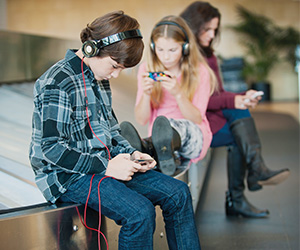Our children will, as adults, experience new tech heights beyond the limits of our imagination. So should we let the inevitable take hold now? Or do we restrict, restrain and reject the tentacles of technology? Ciska Thurman uploads some answers
 Be honest: how often do you answer your kid’s question while looking at your phone or laptop? And how often do you only hear the question the third time round, and answer with ‘Just a second…’?
Be honest: how often do you answer your kid’s question while looking at your phone or laptop? And how often do you only hear the question the third time round, and answer with ‘Just a second…’?
Children mimic what they see, which is partly why babies are so drawn to phones and TV remote controls. We appear to place importance on these items, so why wouldn’t they want to engage with them?
Stacey Vee, the editor of DigiKids (Digikids.co.za), says the ‘cause-and-effect’ nature of touchscreens is one of the reasons youngsters are drawn in. Whether it is your tablet, flatscreen, smartphone, MP3 player or game console, kids are enticed by all kinds of electronic devices.
The reasons for and against exposing your little ones are equally compelling, so Club asked portal editor Stacey to outline some of them.
The good
• There is huge potential in the field of education. There are apps available that can enhance a child’s ability to learn by creating interactive, meaningful and educational experiences.
• Various improvements in hand-eye co-ordination have been demonstrated.
• Technology helps to develop spatial skills – children are better able to match shapes and visualise 2D and 3D objects.
The bad
• Too much screen time, especially for children under the age of two, decreases their time spent on creative play.
• It can have a negative impact on social behaviours (the way in which they interact with other kids their age).
• Recent studies suggest that because young people have instant access to information, they are losing the ability to store knowledge long-term.
Draw the line
Rejecting technology altogether does a disservice to your youngster. But what rules should govern the introduction of a smartphone or tablet – and what age is appropriate?
A recent poll suggests middle-class South African parents are buying their kids cellphones between the ages of 10 and 13. Some opt for call-and-SMS-only phones, while others find the benefits of instant messaging apps on smartphones more useful. Toddlers are exposed to their parents’ tablet by the age of two, and many have their own by the time they hit primary school.
Overload
Digital overload is a concern; some kids are even being treated for technology addiction. When devices start to affect your youngster’s sleep, behaviour and diet, it’s time for a digital detox.
Nikki Bush in her book Tech-savvy Parenting (co-authored along with Arthur Goldstuck) highlights some of the warning signs – something she calls the ‘Triple “S” Syndrome’: Solitary, Sedentary, Screen-based.
‘One of the key developmental areas in childhood is socialising and this must be done through real, face-to-face play activities,’ says Nikki. A child who spends a lot of time alone, in front of a screen, misses out on opportunities to interact and communicate.
‘Movement helps to wire the brain for academic learning, which means a sedentary existence must be avoided at all costs,’ Nikki asserts. Sedentary children also become more difficult to motivate and discipline.
‘Finally, on-screen activities can become very addictive because they stimulate the secretion of chemicals [dopamine] from the pleasure centre of the brain. Children experience a false sense of achievement without having done very much.’
They also miss out on multi-sensory stimulation, not just through the eyes and ears, which is crucial to learning about the real world.
The modern-day playground is not only physical, but virtual. As parents, we don’t need to fear our children’s relationship with technology, but we do need to manage that relationship.
PRESS PAUSE
Staying in touch with kids’ safety is a strong motivator, but what boundaries are parents putting in place when taking this first tech step? Stacey suggests some basic ground rules:
For children under five
• Supervise and guide all tablet playtime.
• Limit TV and tablet to 20-30 minute stretches.
• Keep the tablet on aeroplane mode so kids can’t browse YouTube or download apps.
For older children who have a tablet or smartphone
• Check their browser history frequently.
• Install an app that monitors just how much time they spend online.
• Set limits: No gadgets at the dinner table and no gadgets after lights out (so no sleeping with a phone next to the bed).
EDUCATIONAL APPS
• For toddlers, apps from the developers Toca Boca or Duck Duck Moose are very popular.
• For little ones getting into the alphabet and reading, Endless Reader is highly recommended. As your child’s reading level develops, you can buy packs of new words to learn.
• For maths enthusiasts, parents are raving about PhotoMath. You snap a photo of an equation, and it does the calculation with you step by step.







